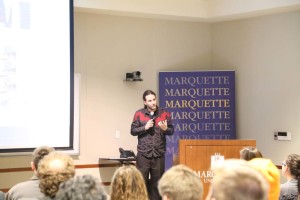
Students and community members piled into the Beaumier Suites in the basement of Raynor Memorial Library Tuesday to listen to Cuban activist Orlando Luis Pardo Lazo speak on government censorship in Cuba and what activists like him are doing to combat it.
Pardo Lazo documented what he saw in Cuba, particularly social media. He has blogged for several websites that include allvoices.com, El Nacimal, Diario de Cuba and Orlandoluispardolazo. He also has his own photo blog, Vocescubanas.
His particular blogging has always been difficult, as he said Cuba’s government is severe and repressive on anybody who opposes it. With more Internet use around the world, the Cuban government has tried to transition itself as well in order to retain this power.
“They are transitioning from power to power,” Pardo Lazo said. “They are attempting to mutate without losing central control.”
Instead of trying to completely block the Internet, Cuba is attempting to control it. The country developed its own blog called the Blogoserfa Cuba on Twitter and Facebook. The government-controlled blog will not include any independent bloggers like Pardo Lazo.
The Cuban government also developed EcuRed, a website similar to Wikipedia. Unlike Wikipedia, where information is changeable, this information is nearly impossible to change. Cuba’s government also said that no independent person can develop a website. The only way to register a website in Cuba is to have a website for a business a citizen owns, which the government will monitor.
Not only has the government controlled independent bloggers, but it pretended to be an independent blogger to give the illusion that it provides citizens freedom on the Internet.
“Cuba is a black hole in terms of connectivity,” Pardo Lazo said.
The repression of the Internet is causing citizens to attempt to leave Cuba. Since 1995, 600,000 people immigrated to the United States. Other Cubans are trying to fight back against the repression. The Ladies in White, an activist group in Cuba, has attempted several protests against the repression, but many of these members have been arrested without charges.
“I have been arrested three times,” Pardo Lazo said. “One time was particularly difficult because I was unable to contact my family for four days. I was eventually released with no charges against me.”
Despite all this, there are many ways independent bloggers are able to get their messages out. There are democratic embassies that allow bloggers to print their work. There is also a black market system used to get Internet access, but Pardo Lazo said it can only be accessed safely after midnight.
Included in the black market system are offline packages, which usually include a DVD or hard drive of information that would be unavailable otherwise. If the black market is not an option, people set up Wi-Fi networks in neighborhoods to receive Internet.
Pardo Lazo said the threat of censorship is something that is necessary when searching for stories.
“When censorship is not coming for you, you’re doing something wrong,” Pardo Lazo said.


Che Guevarra • Dec 10, 2014 at 9:37 pm
I wish the economic embargo on Cuba would end. If so, this would be a non-issue. What did the embargo accomplish? The Cold War is over. Politicians preach peace for Israel and Palestine yet Cuba is 90 miles away and nobody can figure out how to make the relationship work? Closing Guantanamo was a step in the right direction.